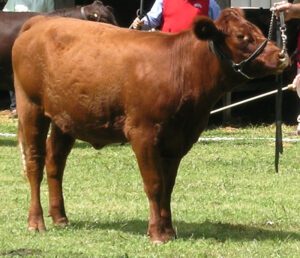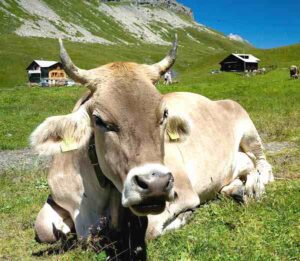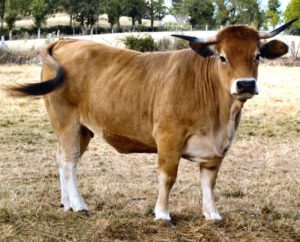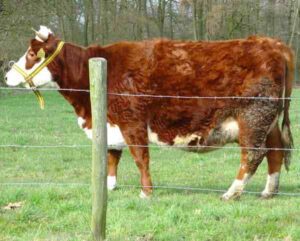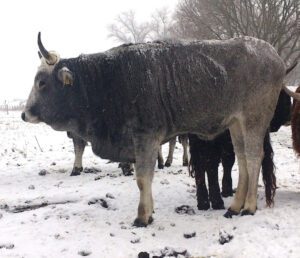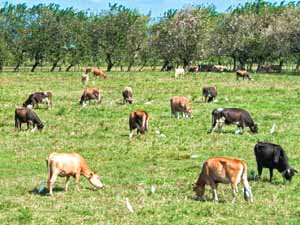The White Park cattle is a rare breed of large horned cattle with ancient herds preserved in Great Britain. The breed has been documented in Britain since the thirteenth Century. There are sill several ancient herds in existence that date from that time.
The White Park cattle are also known by some other names such as Park, White Forest, Wild White, White Horned and also known as the Ancient White Park in North America.
The breed includes two very rare types often regarded as distinct, the Chillingham and the Vaynol cattle. During the pre Christian era, the White Park cattle were bred and used for ceremonial purposes.
Herds of feral cattle became scattered throughout Scotland, England and Wales in the centuries that followed. And those feral cattle were hunted as trophy animals. Some of the herds of the feral cattle were enclosed into deer parks, although most of the animals were free to roam.
The number of free roaming cattle disappeared as their habitat was gradually reduced, leaving only the ‘Park’ animals as peresentatives of the ancient type. The White Park cattle breed is pretty rare today.
The Park Society was formed in the year of 1918 for promoting these historic cattle breed. And the Park Society identified six herds of polled cattle and nine herds of horned cattle in it’s first herd book. Read more information about this remarkably ancient cattle breed below.
White Park Cattle Characteristics
The White Park cattle are a medium to large sized animal with relatively long body. They are usually white in color with black points, although the black points can be red occasionally.
Both bulls and cows usually have large horns. Average live body weight of the adult White Park bulls vary from 800 to 1000 kg. Although their body weight vary depending on the grazing qualities.
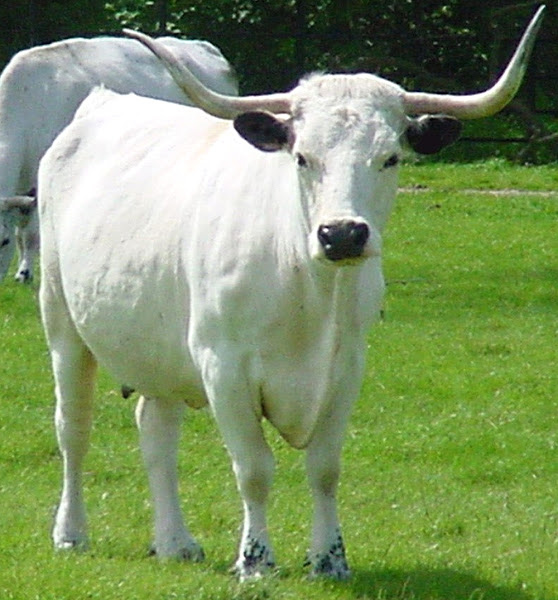
And the bulls can weight about 1250 kg under good grazing conditions. But the cows are relatively smaller. Their average body weight is between 500 and 700 kg. Photo and info from Wikipedia.
Uses
These animals are used for both meat and milk production. The bulls are also used for crossing other cows.
Special Notes
The White Park cattle are very old breed of cattle. They are robust animals with long and large size. They are good for both meat an milk production. The breed is noted for producing quality beef with especially good marbling.
They are very hardy, tough and thrifty cattle breed and very good for conservation grazing. The White Park cattle thrives on a wide variety of grazing types including poor coarse forage.
The breed is genetically distant from most other cattle breeds. And this breed’s crosses have a great deal of hybrid vigor. However, review full breed profile of this breed in the table below.
| Breed Name | White Park |
| Other Name | Park, White Forest, Wild White, White Horned and also known as the Ancient White Park in North America |
| Breed Purpose | Meat, Milk |
| Special Notes | Active, Hardy, Docile |
| Breed Size | Medium-Heavy |
| Bulls | About 800-1000 kg |
| Cows | About 500-700 kg |
| Climate Tolerance | All Climates |
| Coat Color | White |
| Horned | Yes |
| Milk Yield | Poor |
| Rarity | Rare |
| Country/Place of Origin | United Kingdom |

